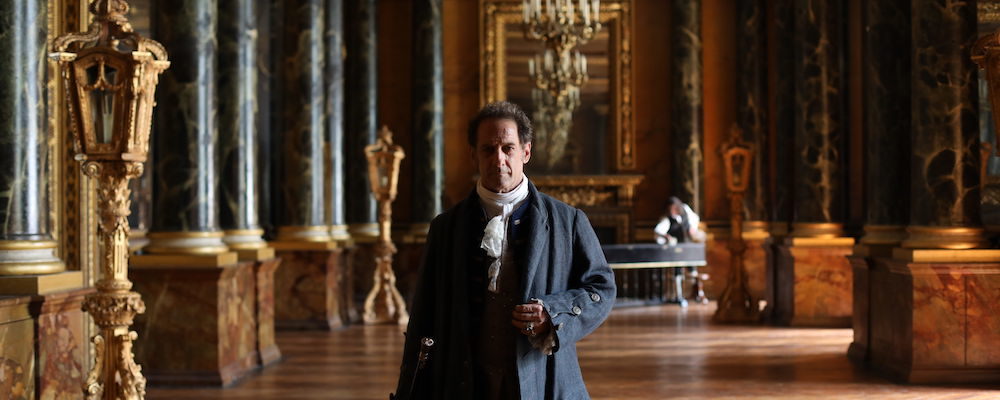‘Casanova, Last Love’ Changes the Rules of Engagement
Tony Sokol
As the title implies, veteran French filmmaker Benoît Jacquot’s “Casanova, Last Love” ends a longtime romance. Giacomo Casanova (Vincent Lindon) held his own in the company of Voltaire, Goethe, Mozart, and Benjamin Franklin. He was such a legendary womanizer, his name has become synonymous with seduction. His conquests included princesses and expert marksmen. Marianne de Charpillon (Stacy Martin) has him in her sights, but takes her time pulling his trigger. It is a temptation, and it would be a shame to give into it. The period piece offers modern solutions to age old problems. The woman who defies the infamous scoundrel is somewhat disreputable herself. She dangles this like forbidden fruit while she nibbles at the time’s oppressive social order.
This is possibly the last film for Jacquot, who is 74, and he takes his time. He displays his moral simply, and maintains a certain distance from the proceedings. Tensions rage just beneath the surface, but a well-turned cheek can keep them forever at bay. Casanova is a control freak, and this is the story of the only time he lost control. It happened decades earlier, but continues to haunt him as a 68-year-old man. The film is wryly witty. The dialogue is modern but not burdened with anachronistic vernacular. It is not flowery. It is unadorned by abject descriptive terms. It is plain and unpretentious.
This costume drama opens in 1793. Casanova is a librarian at Count Waldstein’s castle in Bohemia. He has settled down to write his memoirs after a lifetime on the move. Casanova lives his life in isolation, but tells the nobleman’s daughter Cécile (Julia Roy) about his last trip to London. Casanova, the legendary lover, is no anglophile. He was at the island once, 30 years before in 1763, and was so appalled he never even learned the English language. Just the thought of the British bottoms he’s witnessed shitting in the woods is enough to inflame his bulimia. His confidante assures him that is when the countrymen show their best sides.
Although Casanova arrives in the country just one step ahead of a scandal at home, he is embraced by the aristocracy. All the best gentlemen recommend all the worst women like they are platters of hors d’oeuvre, and boast of their inability to maintain intimacy longer than a single evening. Casanova’s friend, Lord Pembroke (Christian Erickson), can barely look at a lady after he’s had sex with her. “Growing attached to one woman is the worst thing possible,” he says later. Pembroke learned quite a lesson from his one night with La Charpillon, who stiffed him after pocketing a down payment on some upscale merchandise.
La Charpillon is the unattainable fantasy, when you had to pay extra for such kinks. While they first meet amidst outdoor sexual frolic, she remembers the newly reluctant hedonist from an encounter they’d had when she was an 11-year-old girl. It was transformative for the two of them. Casanova is an alchemist who has seen some success. La Charpillon first comes to him looking to get him to fund the work her Aunt Anna (Hayley Carmichael) is doing for a youth-restoring elixir she hopes to sell. Casanova ultimately isn’t buying, though. He’s found his own elixir of youth in Marianne, but wants to skip the surcharges her mother (Anna Cottis), who is also her pimp, charges, even after a night at the opera.
Casanova’s approach to sexual conquest is predatory. His privileged station in society allows him to escape its stifling norms which swallow the opera singer Madame La Cornelys (Valeria Golino), a past lover who achieves financial independence, only to flee England in scandal. Her story is an important one. In so many ways she mirrors the raucous pleasure-seeker of the title, but is left a dangling participle. Just like Casanova is left a weathered has-been, exiled by the thrall of a cruel prostitute.
Jacquot employs judicious use of handheld cameras, and almost no closeups. Most of the shots fluctuate between fixed-focus visuals and moving camerawork, which keep a distance from emotional action. The camera captures different characters with a subtly varied approach. Cinematographer Christophe Beaucarne makes good use of natural light, darkening the spaces and bringing a dreamy ambiance. The splendor is up front. The music occurs organically in the scenes, usually on the harpsichord, but is pierced by strings as a soundtrack. Pascaline Chavanne captures the 18th-century costumes with velvet finesse. A wide array of powdered wigs keeps a lid on the courtly intrigue.
Jacquot isn’t criticizing past morality, but inserts a kind of monogamy into the consciousness of the sexual myth. Casanova comes across as a cautionary figure for the early 21st century. Lindon brings a subtle poignancy to his past regrets, but does not have the accumulated wealth of knowledge Marcello Mastroianni brought to his Casanova in “That Night in Varennes.” He certainly doesn’t enjoy any of the gleeful decadence on display in “Fellini’s Casanova.” We see nothing of the youthful fuckboy even in the flashbacks. He is barely recognizable as a womanizer. His attempts are all clumsy fingers and awkward lips.
Martin Scorsese shot his gangster swan song, “The Irishman,” through the lens of toxic male contrition. Benoît Jacquot, who traditionally excels in female-fronted films like “Diary of a Chambermaid” and “Farewell, My Queen,” drowns Casanova in regret. La Charpillon is his sad legacy. “Casanova, Last Love” is a plea for forgiveness and understanding for the age-old lech, now an old aged remnant becoming who is losing his relevance and questioning virility.
“Casanova, Last Love” releases July 14 in New York and Los Angeles.

